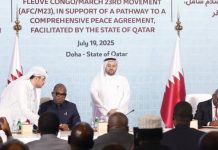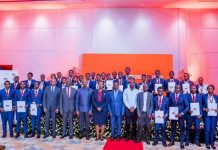Donnah Rubagumya
Africa-Press – Rwanda. I just returned to Kigali after a month-long road trip, not chasing postcard views but hunting something bigger, opportunity. What started as an opportunity-seeking escape ended up a discovery of untapped wealth, not in minerals or markets, but in the invisible ties binding Rwanda and Uganda’s destiny. The journey stretched nearly a thousand kilometres, from Rwanda’s disciplined hills to Uganda’s open plains, tracing a line of shared stories disguised as separate nations.
I passed through Mbarara’s sunlit streets, Ibanda’s serene ridges, Fort Portal’s lush expanse, and Hoima’s restless buzz before reaching Panyimur, a fishing town on the edge of Lake Albert that felt both foreign and familiar. There, amid the scent of dried fish, I heard something unmistakable: Kinyarwanda. A man running a small boutique greeted me as though I had never left home. That voice, so ordinary yet so profound, was the beginning of a realization that Rwanda and Uganda, despite their borders and politics, are still one continuous story. Interwoven by people, culture, and an economy waiting to recognize itself.
In Dei, a small fishing border town only a few kilometres from Mahagi port in DR Congo, I met men selling fresh milk whose conversations drifted in and out of Kinyarwanda. They called out each other in the same accent you’d hear in Nyagatare. Further inland, in Omoro and Nwoya districts, I came across Ugandan Banyarwanda farmers herding cattle. I spent a few days in Gulu city to recover from Panyimur’s fish scent hangover, and I was amazed how the city is full of Banyarwanda, not only Ugandan Banyarwanda, but a few had just come from Kigali. In Hoima, the oil city, I joined a group of men speaking Kinyarwanda mixed with Runyoro as they discussed business over tea. Everywhere I went, I encountered the same thread, a shared rhythm, familiar laughter, and the quiet discipline of people who could belong on either side of the border.
The deeper I travelled, the clearer it became that Uganda and Rwanda are not two separate tales. They are one long narrative interrupted by colonial lines and political moods. Our people are bound by history, movement, and survival. Long before independence, cattle herders and crop traders moved freely between the two territories, building bonds that no customs post could erase. The road from Mbarara to Kigali still feels less like a crossing and more like a return. And yet, looking out at Uganda’s northern plains, so vast, fertile, and underused. I couldn’t help but ask why our economies haven’t evolved as naturally as our cultures have.
Uganda’s abundance of land, water, and energy, when combined with Rwanda’s efficiency, organization, and innovation, creates a natural partnership. The complementarity is obvious. Rwanda has perfected small-scale excellence; Uganda holds the scale and resources to multiply it. What’s missing is structure, a shared commercial bridge to harness this potential beyond political cycles.
That’s when the idea of Runda Holdings Ltd began to take shape in my mind. Runda, drawn from Rwanda and Uganda, would be a private sector holding company, owned equally by both countries, built not on diplomacy but on enterprise. Imagine each side contributing $25 million as seed capital, anchored at Kigali International Finance Centre, which already provides a credible financial environment for cross-border investment. Runda Holdings would be guided by profit, discipline, and transparent governance, not politics or bureaucracy.
The company could launch subsidiaries focused on the sectors that best reflect our shared strengths and opportunities. In agribusiness, the fertile plains of northern Uganda are baskets of large-scale merchandised grains farming.
The north alone could feed Africa and beyond if commercialized efficiently. The plains of northern Uganda can become Africa’s next beef and milk-churning powerhouse if developed at scale, outcompeting countries that currently dominate the export market. During my visit to Aswa Ranch, operated by the National Animal Genetic Resources Centre and Databank (NAGRC-DB), I saw endless grasslands and a capable institutional framework. But only a fraction of its potential realized. NAGRC manages several such ranches across Uganda, from Maruzi to Nshaara, each with the power to turn Uganda into an agricultural export leader. Combine that with Rwanda’s disciplined processing systems, suddenly you can envision a powerful regional agri-industrial synergy. Imagine beef, milk, and hides flowing from Uganda’s northern plains, processed and branded through Rwanda’s quality systems, reaching international markets as “Runda Premium Meats.” That is what shared vision could look like if Runda Holdings Ltd ever came to life.
Rwanda’s rolling hills, with their rich volcanic soils, ideal altitudes, and favorable climate, hold immense potential for cultivating high-end, high-net-worth essential oils. The country’s unique terroir is perfect for growing aromatic plants like geranium, lavender, Wild Marigold, Sandalwood and Tagetes oil, which thrive in its temperate conditions and well-drained landscapes. Runda can position this sector to produce premium, organic essential oils that meet global demand for luxury wellness and cosmetic products. With strategic investment in distillation technology, essential oils industry is highly lucrative.
In logistics, it could build a ferry network across Lake Albert, linking Dei to Mahagi and Goma, while running trucking fleets that move seamlessly between Kampala, Kigali, Goma, Bukavu and Bujumbura. The hospitality arm could create branded lodges and service stops along key trade corridors, offering comfort and commerce to traders, tourists, and transporters. And perhaps the boldest division, an infrastructure arm, could revive railway lines, modernize small airports, and invest in inland ports that tie our economies into regional trade corridors.
Runda would not be a political alliance; it would be a business covenant. Its governance must be impeccable. Independent audits, transparent board appointments, professional managers from both nations, and zero tolerance for graft. It would send a clear message that regional cooperation can be commercially viable and ethically sound. Our pension funds and institutional investors are sitting on billions in low-yield assets. Why not channel part of that into Runda, something productive, scalable, and regional, where returns translate directly into jobs and shared prosperity?
Driving back to Kigali, I kept thinking about that man in Panyimur, the one who sold groceries and spoke Kinyarwanda as if we were standing in Kimironko Market. His life, like so many others, proves that integration is already happening. Informally, instinctively, and from the ground up. It doesn’t need a summit or a treaty to exist; it only needs recognition and structure.
That’s what Runda Holdings represents, an act of recognition. It acknowledges that Rwanda and Uganda’s shared past can fuel a shared future, that our people’s instinct to cooperate deserves an institutional form. It’s time to turn cultural kinship into capital flow. Because when I stood on Lake Albert’s shore and heard Kinyarwanda carried by the wind, I realized the truth, the border might divide our maps, but not our destiny. And perhaps that destiny, if we’re bold enough to claim it, begins with Runda.
To those who made my stay in Panyimur worthwhile: Madam Fortunate, Roy, Rtd, Lt William, and His Majesty Rwoth Thopacho Bright Stanley Ombidi III, King of the Pakwonga Kingdom in Panyimur, Afo’yo.
Source: The New Times
For More News And Analysis About Rwanda Follow Africa-Press






